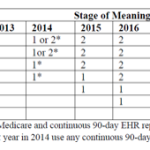 A week ago we provided an introduction to a CMS program flying under the radar and planned to follow up with a deeper dive into the nuts and bolts of the program. We’ve called an audible and on this Memorial Day would like to bring another important issue to your attention: a proposed Stage 2 delay.
A week ago we provided an introduction to a CMS program flying under the radar and planned to follow up with a deeper dive into the nuts and bolts of the program. We’ve called an audible and on this Memorial Day would like to bring another important issue to your attention: a proposed Stage 2 delay.
Just when you think you have the meaningful use program figured out, the powers that be emerge from left field and tweak the rules a bit. Last week a notice of proposed rulemaking (NPRM) was published, and if it makes its way into what’s commonly referred to as a final rule, it will have substantial impact on a broad swath of the nephrology community.
Stage 2 delay in disguise
The big news here is that the NRPM would make Stage 2 optional this year for many providers. That’s right, if this proposed rule graduates to final rule status, those of you who were deciding whether to file for a hardship exception this year or take on the Stage 2 objectives will now have a third choice to choose from. You can elect to report the Stage 1 objectives again in 2014. The CMS press release is very well written and clearly outlines what’s contained within the NPRM. Essentially the proposed rule includes three specific points of interest:
- A Stage 2 delay, basically making Stage 2 optional for 2014 (well, not exactly optional…see the fine print below).
- Providers can report Stage 1 objectives this year using either 2014 certified CEHRT (i.e., Stage 2 ready software), using 2011 certified CEHRT (yes, the software whose certification technically expired on 12/31/2013), or using a combination of 2011 and 2014 CEHRT.
- The NPRM codifies the previously announced Stage 3 delay.
The fine print which accompanies point 1 above is quoted below directly from the NPRM (emphasis added by yours truly).
Using 2014 Edition CEHRT for 2014 Stage 1 Objectives and Measures in 2014 for Providers Scheduled to Begin Stage 2
A provider’s ability to fully implement all of the functionality of 2014 Edition CEHRT may be limited by the availability and timing of product installation, deployment of new processes and workflows, and employee training. This effect is compounded for providers in Stage 2 as some providers may not be able to fully implement all of the functions included in 2014 Edition CEHRT that are necessary to meet the Stage 2 objectives and measures in time to complete their EHR reporting period in 2014. Therefore, under our proposal, providers who are scheduled to begin Stage 2 for the 2014 EHR reporting period but are unable to fully implement all the functions of their 2014 Edition CEHRT required for Stage 2 objectives and measures due to delays in 2014 Edition CEHRT availability would have the option of using 2014 Edition CEHRT to attest to the 2014 Stage 1 objectives and measures for the 2014 EHR reporting period. Providers who are scheduled to begin Stage 2 in 2014 who choose this option must attest that they are unable to fully implement 2014 Edition CEHRT because of issues related to 2014 Edition CEHRT availability delays when they attest to the meaningful use objectives and measures.
Bottom line, if your practice experiences delays in Stage 2 readiness related to either the technology, the resulting new processes and workflows, or employee training, this NPRM will permit you to attest to the Stage 1 objectives, provided you are willing to attest to the fact that these factors led to your inability to achieve the Stage 2 objectives. Clear as mud right?
Implications
In my view this proposed Stage 2 delay is a good-news/bad-news scenario for nephrologists. The good news is that if this NPRM graduates to a final rule, published in the Federal Register with little change, early adopters who attested in 2011 or 2012 will receive a wonderful gift. Instead of facing the much tougher Stage 2 objectives in 2014, or filing for the hardship exception and hoping to avoid the 2.0% Part B haircut in 2016, you may have a much more palatable choice. You may have the opportunity to report the Stage 1 objectives again. And this time the reporting period is three months—any calendar quarter. Further, those of you using an EHR that has not yet achieved the 2014 certification can use your 2011 certified EHR to do the same thing. Ladies and gentlemen, this type of gift is very rare in my experience.
The bad news? We will not know if the Stage 2 delay is real until we see the final rule. When that will be is anyone’s best guess. CMS will accept public comments for 60 days after the NPRM appears in the Federal Register. I cannot imagine anyone will submit a comment opposed to the general nature of the NPRM, but one never knows. After the comment period closes, the comments will be reviewed and that review will be incorporated in the published final rule. My best guess is that we will see the final rule in late August if we are lucky, but more likely sometime in September, if not later. Perhaps more importantly, it is unclear what will be necessary in order for you to attest to the fact that you are not in a position to attest for Stage 2. The final rule will likely clarify the “fine print” I quoted from the NPRM above.
What’s a Stage 2 nephrologist to do?
What you do now will depend on your circumstances. Some of you (very few in my experience) are in the midst of a trial run with Stage 2, using the second quarter as your reporting period. If this is going well, I’d stick it out and attest in July. Many of you are contemplating filing for the hardship exception because of the dialysis encounters. If you find yourself in this bucket, you indeed have an interesting choice. You could still file for the 2016 exception (assuming the application appears on the CMS web site). But you may wish to pursue a different path. You might, for example, relight your practice’s meaningful use engine, and begin capturing and tracking the Stage 1 objectives for the third quarter reporting period. As you recall, the hurdle for Stage 1 is low, and let’s face it, doing this for three months is trivial compared with what you have previously faced. By the end of the third quarter, the final rule should be available and we should get a much clearer view of the attestation piece I referenced above. Finally, those of you using an EHR that does not have the latest certification could move forward with Stage 1 using your existing application. If the Stage 2 delay in the NPRM does not come to pass and your vendor does not cross the certification finish line, you will still have time to file for the appropriate hardship exception.
Flexibility in a dynamic environment
This year has been full of regulatory surprises. Last month the temporary doc fix bumped the ICD-10 implementation a year (just a few weeks after Secretary Sebelius assured us there would not be another delay), and now we receive another olive branch of sorts from CMS. If I were a cynical nephrologist, I might believe election year politics are at play here. Regardless of the underlying cause of these late breaking rule changes, your ability to remain flexible in this market will be critical for success. We will be crafting a comment to CMS regarding the NPRM during the public comment period and you can do the same. Of course you may find it easier to join the conversation here on our blog. Drop us a comment and let us know what you think of the proposed Stage 2 delay.




Bill McElhaugh says
My concern is that waiting until the final quarter brings on the burden on influenza vaccination reporting on the patients from the dialysis unit. Since Acumen is 2014 CEHRT it would be difficult to argue that an Electronic provider using this system can conjure up a reason why they can not attempt stage 2. Especially since the decision on what those reasons are are still to be determined. It would be ideal if one could attempt stage 2 in 3rd quarter and then have the ability to attest to stage 1 in the 4th if one failed to meet targets in stage 2. I know that would never fly with CMS but I think the above article points out no one knows what is going to happen over the next 8 months
JY says
Has any more news come out on this issue? I haven’t seen any in my travels, but Q3 is getting close to complete, and it still isn’t clear for many of us if we will need to attest with Stage 2 or Stage 1 requirements this year. Comments were due July 21st, but it isn’t clear to me how long it takes for the government to finalize this type of thing.
Terry Ketchersid, MD, MBA, VP, Clinical Health Information Management says
No news yet JY. Our government affairs folks will know as soon as the final rule is published and we will make sure to broadly publicize the information.